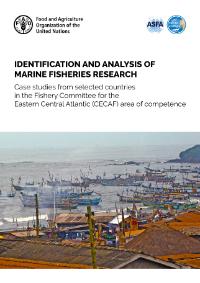During 2020, the ASFA Secretariat supported the CECAF-PESCAO project by compiling an inventory of marine fisheries research produced in nine countries (Benin, Côte d’Ivoire, Ghana, Guinea, Mauritania, Morocco, Nigeria, Senegal, Spain). A search methodology was agreed with the CECAF project team, with support from the EAF-Nansen Programme to identify relevant marine fisheries research. Further parameters, including publication date and author affiliation, were defined in order to conduct systematic and repeatable searches. In the first stage, online searches were conducted using four sources (ASFA, Google Scholar, Web of Science and Scopus). The second stage involved searching local and nationally held collections (library catalogues, institutional websites or repositories) to identify further references. The results from these searches were then combined to produce an inventory of 2 411 unique references. A bibliometric analysis was then conducted on the inventory which revealed intensive publishing activity and strong collaboration across the region, however publishing in predatory journals and difficulty in locating grey literature on online sources were areas where further work is needed to ensure research produced in the area reaches a wide audience. A detailed analysis of research published by authors affiliated to Senegalese institutions was conducted which revealed a significant gender imbalance of authors (only 13 percent of authors identified in the study were female). Recommendations included in this report are to expand the inventory and analysis to other CECAF member countries and to take steps to ensure the grey literature produced by authors from the CECAF region is indexed by online sources.
Full text: https://www.fao.org/documents/card/en/c/cb8788en





